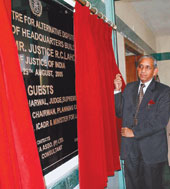 |
 |
| Quick justice: (Top) Chief Justice R.C. Lahoti inaugurates the ICADR’s new premises and (above) the ICADR building |
Some 10 years ago, in the wake of India opening its doors to foreign investment, a group of people came together to discuss a few critical issues that lay beneath all the glitz. A hallowed group, they comprised bigwigs like the then finance minister Manmohan Singh, and Montek Singh Ahluwalia, then finance secretary. And the topic of their discussion was pertinent, given that foreign companies were moving into India faster than a speeding bullet. Would the Indian legal system be capable, they wondered, of effectively handling the legal complexities that were bound to arise between multinational companies and Indian entities?
“No,” was what Ahluwalia, now deputy chairman, Planning Commission, had to say. Speaking at the inauguration of the headquarters of the International Centre of Alternative Dispute Resolution (ICADR) in New Delhi recently, Ahluwalia reflected on the situation that prevailed then. “Considering that legal proceedings in India took so long to be completed, and that there was a lot of red tape along the way, we realised that a credible alternative legal system had to be put in place to deal with cross-border cases,” he observed.
And it was following these deliberations that the ICADR was formed in 1995 as a body for facilitating national and international out-of-court settlements in India. These could include negotiation, conciliation or mediation between disputing parties from within the country or without through an alternative mode, so as to arrive at a settlement before the issue went to court.
Some work had to be done before the ICADR came into being. The Arbitration and Conciliation Act was enacted in 1996 in accordance with the United Nations Commission on International Trade Law (UNCITRAL), under which foreign awards could be enforceable in India.
But clearly, all was not fine, despite the paperwork or the fact that the ICADR was recognised by the Indian judicial system and had, as its patron, the Chief Justice of India. Or why would it take 10 years for the body to acquire a permanent address for itself, a basic requirement that no institution can do without?
Supreme Court lawyer Lalit Bhasin provides an answer. “In the past, mere lip service has been paid to alternative dispute resolution in our country,” he says. “Compared to other countries in the West or even Japan, the system has never been formally put in place here,” he adds.
The reasons for the failure of alternative arbitration in the past are many. “To begin with, alternative arbitration in India has always been a weekend activity and has not been focused on as a full-time occupation,” says Supreme Court judge Y.K. Sabharwal.
R.C. Lahoti, Chief Justice of India, underlines another problem. “Since many of the arbiters who carried out alternative arbitration proceedings were former judges who were used to the slow ways of the Indian legal system, they seemed to go slow on this front as well,” he says. The shortage of funds compounded the problem. “In the absence of necessary infrastructure, we had to operate out of rented premises in hotels,” says B.S. Saluja, member, governing council, ICADR.
All these shortcomings prevented alternative dispute resolution from gaining ground in India. And the figures more than substantiate the point. Till date, only 25 arbitration cases and three conciliation cases have been dealt with by the ICADR, says Saluja. “Among the public sector units in India, only the Mahanagar Nigam Telephone Limited has so far included our arbitration clause in its tender agreements,” he adds.
However, experts feel amends can still be made. H.R. Bhardwaj, minister for law and justice and chairman, ICADR, believes the new premises will give the ICADR a much-needed institutional image. “We have also opened alternative dispute resolution centres in each state to facilitate arbitration at a local level,” he says. “That apart, we have established training centres in Bangalore and Hyderabad to train personnel to carry out alternative arbitration procedures,” he adds.
Ahluwalia feels that if successful, India could also engage in third -party arbitration for foreign companies. “We have the necessary skills for the purpose and the costs borne by the parties would be far less in India than what they would be in their own countries,” he says.
Lahoti sums up the recent developments by quoting author Victor Hugo. “Nothing is more powerful than an idea whose time has come,” he says. A good 10 years later maybe, but better late than never.










